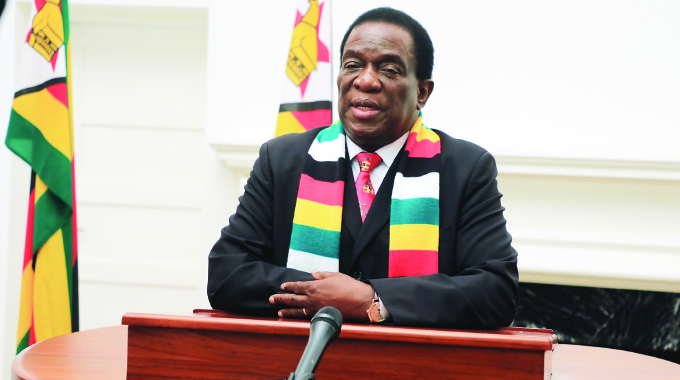EDITORIAL COMMENT: President’s message timely

President Mnangagwa has always, since he took office, been consistent in his primary thrust, the strategy rather than the tactical programmes to achieve that end, and he pressed the same message yet again at the National Thanksgiving and Dedication Service on Christmas Day in Bulawayo.
He was speaking as President and Head of State of Zimbabwe, which is why there were zero explicit or even implicit references to political parties, his own or anyone else’s. The thrust has been consistent, and he stressed the needs again: He wants to see a prosperous, honest, hardworking, peaceful and democratic society where everyone moves step by step forward with a better life and no one gets excluded or left behind.
So his message was the pure national message. And these goals are surely the goals that form a lot of the national unity that he has been stressing, along with the commitment to using democratic systems and argument to make their achievement more likely.
One thrust was the forthcoming 133 local authority and National Assembly by-elections, almost all on hold since last year. He wanted churches, and the whole population, to work hard that these polls were peaceful, that people could choose who they want.
This seems obvious, but we have seen polls marred by violence. In a democracy we express our choices and our support by making an “x” on a ballot paper, not by hitting other people or threatening to hit them. Of course emotions can swell, and election results are important. But even more important is the requirement of everyone to use the levers of democracy, and to accept the final result.
There is a tendency for people to downplay by-elections, especially those for local authorities, because they do not change the party alignment by much. Even with 133 seats up for grabs, and even with the swathes vacancies in some urban councils following the recalls of councillors who had their own views of opposition leadership, no council will change hands regardless of how the vote goes.
The number of National Assembly seats up for grabs is too small to make much difference to the party line-up even if one party won the lot. Even in the most extreme cases in urban councils, there are not enough vacancies to switch control of a council; we need to remember that significant group of councillors now on suspension pending trial.
They cannot attend council or committee meetings, but still hold their seats. Parliamentarians on bail pending trial can continue to sit. The difference follows from the different functions. Councillors are largely members of an executive body, making decisions, while MPs are largely lawmakers, with ever more watchdog functions through the committees, but have zero executive authority if they are not in Cabinet, and these days someone facing a trial does not sit in Government.
One major difference from the last 2018 general election, though, in local councils is the greater responsibility of councillors following the conversion of devolution from a talk shop to very large sums of cash. When you are entrusting a council with anything between several score million dollars to several hundred million dollars the President probably expressed most people’s needs for hard-working, competent and honest holders of office. So we now need to look at candidates very carefully indeed rather than just the nominating party next to the name.
Such a large block of by-elections will obviously be a good dry run for the 2023 general elections, seeing if the reforms in processes work as intended, or if they have to be upgraded further or replaced. And any further gaps that need to be filled can be identified. This gives Parliament plenty of time to make new amendments to electoral law, or the Zimbabwe Electoral Commission when it comes to implementing the law. Again this is a laid down process involving discussion, legal drafting and the like, not rampaging mobs. And those who think more changes are needed must be using that system, proposing in Parliament precise amendments, not making vague statements that add zero value.
Just about everyone, bar the local supporters of economic sanctions against Zimbabwe, is keen on growing prosperity. When making Head of Government speeches and interventions, rather than the Head of State addresses as we saw at the weekend, President Mnangagwa has gone into a lot of detail and tried to explain where each programme fits it, and what it is designed to achieve.
But these programmes are not some unalterable divine commandment. If anyone has ideas of how a particular programme can be improved, replaced or added to the list then they should speak up. Any human endeavour can be upgraded, sometimes what looks good might need major reform in light of experience, and sometimes something that is generally desired cannot work. But let us talk.
A consistent thrust of the President is that we need to do the work of meeting our goals largely ourselves. While we appreciate any help anyone wants to give, saviours are not going to parachute out the sky. The President, as a war veteran, knows this instinctively since Zimbabweans won their freedom by fighting for it, with modest technical aid but no one else putting their lives on the line.
And as the President has said on other occasions, a lot of the other things we need to do are pretty simple compared to that immense national achievement, and we need to have more confidence in ourselves and more willingness to work with each other as we lift ourselves into prosperity, with no one left behind.










Comments